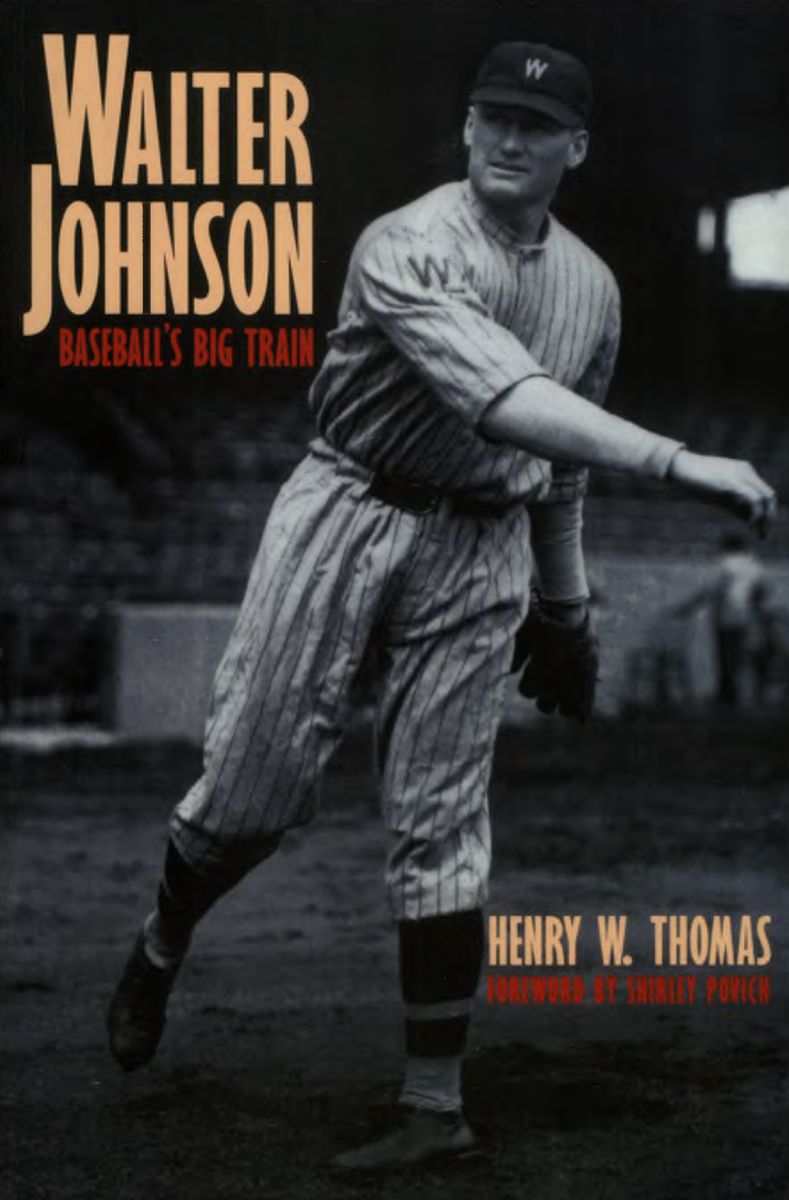Mr. Book just finished Walter Johnson: Baseball’s Big Train, by Henry Thomas.
Walter Johnson was one of the greatest pitchers in baseball history. His 417 wins are second only to Cy Young’s 511, while he had a 2.17 career ERA. Johnson’s strikeout record was considered unbreakable until Nolan Ryan and Steve Carlton came along (his total has subsequently updated by Elias to be 3,515 instead of the 3,508 previously in the books). In 1936, Johnson became one of the five original members of the Hall of Fame.
The book did a great job covering Johnson’s brief minor league career. There were plenty of good stories ranging from his new suit being ruined by peanut butter and jelly sandwiches his mother made for him, and then packed with the suit, for his trip to meet his new team for the first time, him getting released by a manager who told him he’d make a better outfielder than pitcher, him making a name for himself in Idaho, a brawl his teammates were involved in early in his brief time in that state and then him being signed by the Washington Senators. Johnson was actually very reluctant to sign with them, since he lacked the confidence at the time to think he could make it on the east coast, but of course, he eventually did give it a try.
One of the great things about baseball and history books is all of the little tidbits that are in each of them. For example, I hadn’t known that despite Johnson losing his MLB debut to the Tigers, 3-2, he made such a great impression on them that Ty Cobb went to the team president Frank Navin and told him to buy Johnson immediately, “Even if he costs you $25,000, get him.” But, Navin was too frugal to even consider it. And I hadn’t known that, during his rookie season, one of his teammates tried to teach Johnson the spitball (which was legal at the time) but he couldn’t master it. Instead, Johnson perfected a changeup, which perfectly supplemented his incredible fastball.
In October 1910, the Washington Post had a headline about a rumored Johnson for Ty Cobb trade. The next day, Navin denied it saying the Senators would never consider any offer for him and Johnson was “in my opinion the best pitcher n the country, and doubly valuable because he is so young.”
One very common theme of both Johnson’s career and of the book was how, for most of Johnson’s career, as great as he was, his teams were not good at all. During his career, they were 150 games above .500 when Johnson pitched, compared to 199 games under .500 when he didn’t.
The author also includes clippings from articles written by journalists of the day throughout the book. The book also does a good job covering what kind of man Johnson was off the field.
Some more highlights of the book was a discussion of the Federal League’s attempt to sign Johnson, his relationship with Ty Cobb and the Senators consecutive pennants in 1924-25. The Senators won the World Series in 1924 before becoming the first team in World Series history to blow a 3-1 lead and lose the series.
I give this book an A+ and inducted it into the Hall of Fame. Goodreads requires grades on a 1-5 star system. In my personal conversion system, an A+ equates to 5 stars. (A or A+: 5 stars, B+: 4 stars, B: 3 stars, C: 2 stars, D or F: 1 star).
This review has been posted at my blog, Mr. Book’s Book Reviews, and Goodreads.
Mr. Book originally finished reading this on June 19, 2024.


